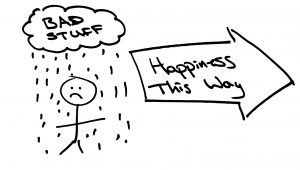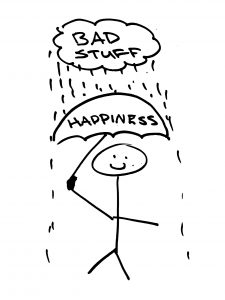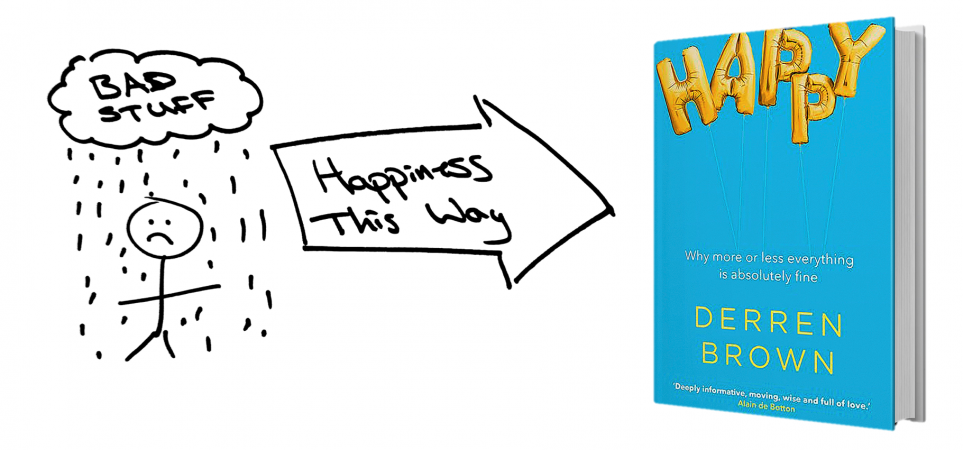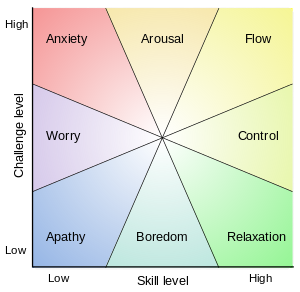Why me? Why not me?
I was once asked what my aim in life was. I gave a somewhat scripted answer about reaching a pinnacle in my career, having financial freedom, a family and so on. The person asking the question looked me in the eye and said “aim to be happy. Nothing else is important.” That was a view I held, only it was my internal, private aim. From that day on, I made that my vocal aim – I want to be happy.
Today, that is no longer true. I do not aim to be happy.
I have finished listening to ‘Happy’ by Derren Brown. The mind-reading magician has put pen to paper to share his views and knowledge of the various philosophies surrounding happiness, with a focus on stoicism. I’m a big fan of Derren as a magician and to hear that he was releasing a book was intriguing, however, I was sceptical at the topic at hand, yet he delivers the subject perfectly. He combines informative lessons on the stoic beliefs with practical instructions for implementation, whilst drawing on his experiences to show real-world use cases.
What is stoicism?
Stoicism was developed in the times of ancient Greece. Many of the beliefs are attributed to two people; Marcus Aurelius and Epictetus, an emperor and slave, respectively. Two people at the opposed ends of the societal scale, yet with the same views on how they should conduct themselves. The application of the same rules in two scenarios that from a macro view looks polar opposite, yet when breaking it down to a micro level, they are the same. This is what makes this philosophy so powerful.
Ok, that’s cool and all, but what does it actually teach us?
Stoicism is the idea of controlling the controllable and not concerning ourselves with the rest. It is recognising our current state and making peace with what we have. It is the removal of outward expectations that could harm our well-being. It’s understanding that you are not owed anything and that “the universe is change: our life is what our thoughts make it.” – Marcus Aurelius.
The essence of the philosophy is that we should live so that our happiness depends as little as possible on external causes Marcus Aurelius
Sick and yet happy. Dying and yet happy. In exile and happy. In disgrace and happy.Epictetus
What about the real world?
It all sounds nice and ideal doesn’t it… a bit too nice. Ok, so what if some people years ago were able to live in harmony, that’s not exactly relevant to the masses.
This is the issue Derren Brown tackles in his book. What are the applications for the masses? How does it compare to the self-help solutions available today? Can it really help in the worst scenarios imaginable?
Point 1 – Lots of self-help advice is harmful
Many ‘experts’ teach the power of simply thinking positively and your aims will come true. If they don’t it’s because you don’t believe enough. That simply isn’t true, good things don’t come from nothing. The right frame of mind can be a critical component, but you also need other factors, such as hard work.
Point 2 – Happiness is a state of being, not an aim
If you aim to be happy, you may never reach it. You’ll have criteria to meet that will ‘make you happy’, but what if those don’t occur, will you actually be happy once you have them? Happiness is a state of being that you can have right now. It is the ability to filter out what we cannot control and focus on only the things we can; usually, these are only things related to ourselves – how we act, talk, think and so on. How people treat us, for example is not in our control, and therefore should not interfere with our happiness.
I view it as the below image. If we view happiness as an external desire, we will remain surrounded by the negatives, the barriers and the reasons why ‘life is unfair’. Instead, if we remove those things, we will only be left with happiness.


You aren’t owed anything. You aren’t immune from anything.
This final point is potentially the most powerful, but also the hardest to explain. It feels wrong telling people in life-changing situations how to act and behave when I am not in a similar situation. Derren expressed the same concern, instead, he drew on the views of others and I will do the same, quoting directly from the book, the words of Debra – a cancer patient, the victim of gross malpractice and miss-diagnosis and failed operations. She knew she had a minimal amount of time left to live, yet remained upbeat and optimistic about what each day could offer.
“Very often as children we are set up for a fall … the downtrodden skivvy marries the prince, the wicked stepmother is defeated by the fairy godmother, etc. I’m sure you get my drift. The general moral of the story is that the ‘Goodies’ always defeat the ‘Baddies’.
And how many of us, who are parents, are guilty of saying, ‘If you’re a good girl/boy you can have some sweets or a toy.’ The subliminal ethos being subtly weaved is that good things happen to good people, and bad things happen to bad people. This is utter balderdash. The reality is that good and bad things happen to all people, death perhaps being the most extreme (and yet the most common) example. As the saying goes, ‘Sh*t happens.’ Therefore, when I was diagnosed, rather than thinking (as specified in the NHS leaflet), ‘Why me, what have I done to deserve this?’ I thought ‘Why not me?’.”
It is an extreme case that we all hope to never encounter. Yet, we can surely apply some of the thinking to the minimal day to day occurrences. Perhaps, the secret to happiness each day isn’t to seek all the good in the world, but to accept the inevitable bad, understand it for what it is and continue to control what we can in an ever-changing world.













